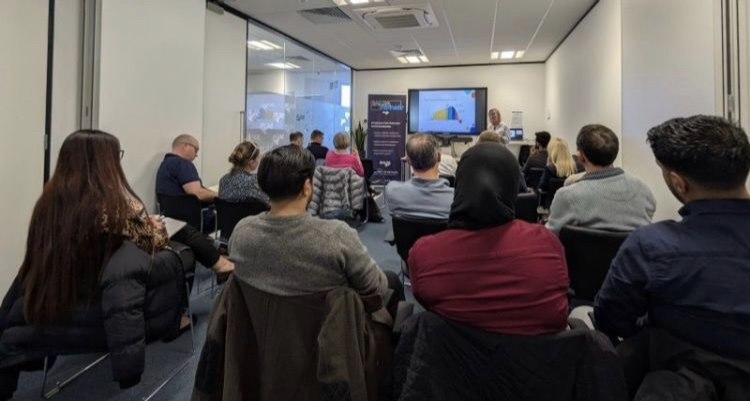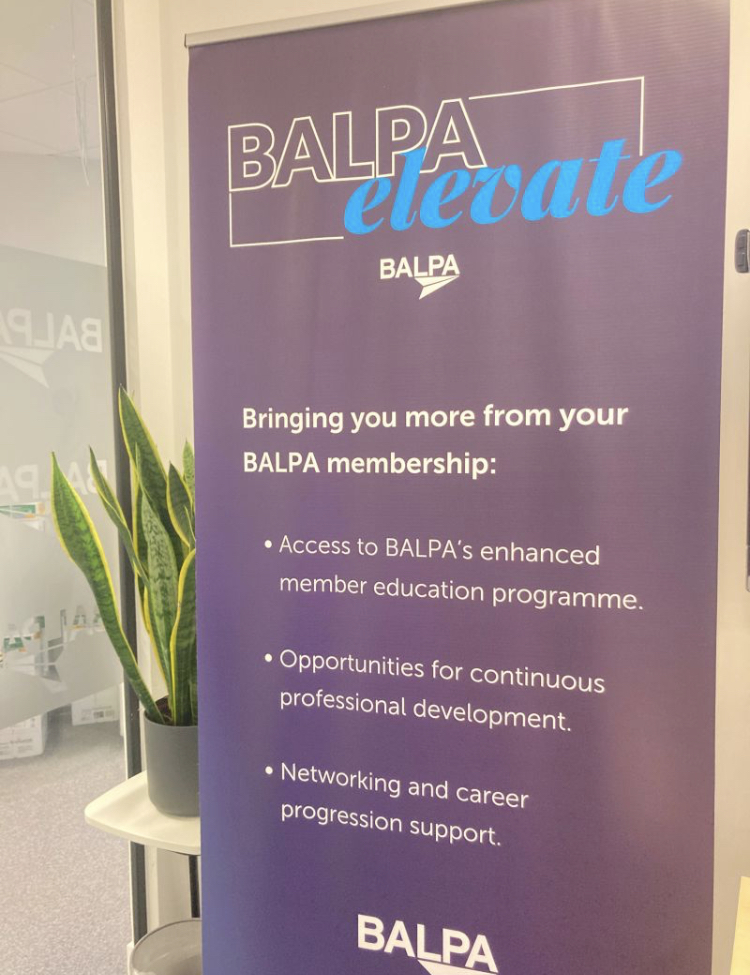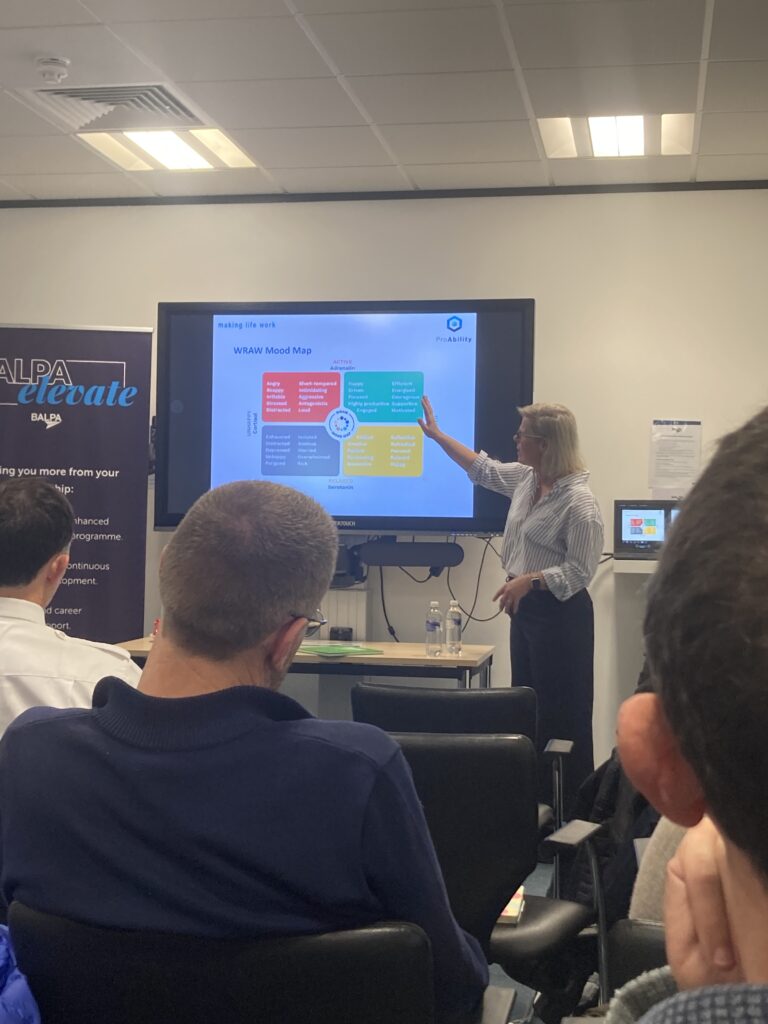Seminar run by Louise Pode at BALPA – November, 2024
Attending a Resilient-building workshop

I felt like this was preventative therapy. One of the best workshops I’ve been to.
I’ve always dreamt of being an airline pilot, I knew that the road ahead wouldn’t be easy. Some of the stumbling factors include – the rigorous training (ATPLs in particular), the long hours, and the mental stamina required is like no other. But what I didn’t fully understand until I attended the Pilot Resilience Building Workshop at BALPA HQ was just how crucial mental resilience and well-being would be to my journey.
Run by Louise Pode, a resilience and wellbeing coach, this workshop was an eye-opener and provided me with valuable tools that I never knew I needed.
One of the best workshops I’ve attended. She highlighted the practical toolkit in building resilience – from stress bucket visuals to exploring the 5 pillars of resilience, WRAW mood map and thinking traps. We also discussed our inner chimps.
It wasn’t just about coping with the stress of exams or tough flying hours; it was about understanding how to manage stress in a healthy way, build resilience, and take care of my mind and body so I can be at my best when it matters most.
Here’s a breakdown of what I learned and how it’s already benefiting me as I chase my dream of becoming a pilot. I hope this also benefits you.
Stress Bucket
One of the first things Louise introduced us to was the concept of the “stress bucket.”
Think of the stress bucket as a metaphor of your stress levels. Your stress levels are like water filling up a bucket. Every stressor, whether it’s a difficult flight simulation, a personal issue, or even just everyday life, adds water to the bucket. If you don’t find ways to relieve that stress, the bucket overflows—and that’s when you hit a breaking point.
When I translate this to being a successful airline pilot, the pressure is tough. The airline pilots in the room also agreed – one pointed out you have to be ‘ruthless’ and prioritise your mental health over all else. There is little room for error, and it’s easy to let that ‘bucket’ fill up too quickly. Learning how to manage that stress, before it becomes overwhelming, was one of the key takeaways from the workshop. Louise emphasised the importance of regularly emptying our buckets through various techniques.


Practical skills Louise touched on were as follows:
Mindfulness and Breathing Techniques
One of the most effective ways to manage stress in the moment is through mindfulness exercises and controlled breathing. These practices help you ground yourself and clear your mind. I’ve already started incorporating these breathing techniques in my day to day job and found it has really helped. Just taking a few deep breaths when I start feeling anxious has made a huge difference in my ability to stay calm and focused. It’s something I will definitely use when training for exams.
Building a Support Network
Louise also talked about the importance of having a strong support system, whether it’s family, friends, or colleagues. For pilots, having people to turn to during tough times is essential for maintaining mental health. The aviation industry can sometimes feel isolating, especially during long hours and periods of intense training. Think of family who you can turn to. Maybe think of colleagues or friends who empathise with you. Empathy is a key skill to have as a pilot – it’s also worth thinking how you can become THAT person for someone who may struggle.. hopefully you can be in a position someone can turn to in a time of need… food for thought. 🙂
Positive Thinking and Reframing
One technique that resonated with me was the concept of reframing negative thoughts. i ABSOLUTELY love this part. Whether it’s Grit by Angela Duckworth or Unlimited Power by Anthony Robbins – they have taught me one thing. Your mind feeds of what you think or tell it! So change those thoughts into positive ones. Something hasn’t gone well. Ok. What is the lesson here? What is life teaching me?
Thinking Traps
The above also tied in quite well with the next part – thinking traps’ —the patterns of negative thinking and how it can distort our perception of a situation and make stress worse.
Being aware of these traps allows us to catch ourselves before spiralling into an unnecessary stressful state. By challenging these thoughts, we can regain a more realistic and balanced perspective. One way works really work for me is to step away from my thoughts and talk to myself in the 3rd person. A few pilots nodded they find that really helpful too.

I often find challenges can instantly be seen as setbacks or that ‘I’m a complete failure’ — no doubt there’ll be some sort of failure in training or within the cockpit. Louise taught us how to turn these situations around and view them as opportunities for growth. Instead of focusing on failure, we were encouraged to see mistakes as part of the learning process. This shift in mindset has already helped me stay more positive and resilient. For a long time I struggled with the ‘fear of failure’ I still do. The fear of failure often stops me in my track but I have reshaped my mentality and think by actively continuing I am building resilience – which inevitably makes me a better, resilient pilot. Win-win.
Physical Exercise and Nutrition
It might seem simple, but maintaining physical health is closely tied to mental resilience. Louise emphasised how regular exercise, a balanced diet, and sufficient sleep all play vital roles in our ability to manage stress. Thinking ahead – as someone who will need to qualify for the Class 1 medical and be medically fit to fly this is really important to me (and my fellow pilots).
I’ve made a conscious effort to incorporate cardio exercise into my routine. Something I pushing on is to become better at the stairmaster in the gym and push myself to run that ‘extra’ minute on when running. Challenging myself and achieving a new personal best is a great feeling – and great motivation for next time.
WRAW Mood Map and our inner chimps
We also explored the WRAW (Wellbeing and Resilience at Work) Mood Map – a tool to help track your mood daily! It helps identify when you’re feeling mentally drained or overwhelmed and provides strategies to shift your mood and energy.
The Inner Chimp
Lastly, Louise introduced us to the concept of the “Inner Chimp,” based on Dr. Steve Peters’ work. The Inner Chimp is the part of our brain that reacts emotionally and impulsively, often based on fear or anger. It’s the part of us that might want to lash out or panic when faced with stress. Understanding and recognising when our inner chimp is in control allows us to take a step back and use our more rational side to respond in a calm and measured way. As a pilot this is important – as you may often be put in undesirable positions (or a situation might be peaked from fatigue) and it’s important we can manage these emotional reactions and stay composed in high-pressure situations.
Overall, I found it a really insightful day. It almost felt like being in preventative therapy – if our past teaches us anything (German Wings incident) one thing is for sure resilience is required in abundance to become a proficient airman in all situations. These workshops are incredible resources to help make us safer future pilots. Massive thanks to Louise and BALPA for an amazing session.


